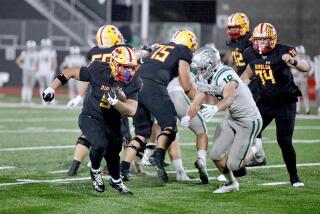Tough Lesson on Rules
- Share via
Last week, three Orange County football teams were stripped of their status in their respective playoffs, two of them for using ineligible players and the third for a fight among players after a game. Cruelly, the teams and their supporters careened between elation and despair as the issues were decided and re-decided in the courts--prompting a judge in one of the disputes to say that pretty soon a good lawyer will be more important to a team than a fast tailback.
When the dust settled, it appeared that one thing survived for better or worse: the rules. That is good, because a healthy respect for the rules of the game is one of the primary lessons that sports has to offer to youths. But, at least in one case, it seems that the penalty was harsher than was necessary.
At two high schools, Huntington Beach and Savanna in Anaheim, highly successful seasons were marred by the discovery that there were ineligible players on the teams. At Savanna, one teammate had played too many semesters. At Huntington Beach, a player did not live in the district with a parent or guardian as required. Especially in the latter case, it appeared that the ineligible player simply did not understand the residential rule, nor did the school offer much guidance. Initially, a Superior Court judge ruled that the penalty of an entire forfeited season was unfair. But California Interscholastic Federation lawyers argued successfully in appellate court that if an exception were made for the youth, any school could “take a chance” and field a player and then seek eligibility later.
Perhaps, however, with these two fresh examples, the CIF, which is made up of school principals, can come up with a more reasonable set of penalties. Instead of throwing away the season, the CIF could declare the guilty player ineligible for playoffs and strip the team of a home-field advantage. Or fine the school, or put it on probation, or remove the coach, or prevent the school from playing in its division the next year.
But what also seems clear from last week is that students either do not understand, or think they can flaunt, the eligibility rules rightfully designed to discourage athletes from “shopping” for schools and control out-of-district recruiting. Coaches and principals need to walk them through the rules and explain that they are serving no one--certainly not their teammates or their schools--by violating them.
As for the Anaheim-Garden Grove Chargers, who play in a league for 12- to 14-year-olds, the penalty for fighting was appropriate. As the team’s coach noted, the team learned “the hard way” that “there’s no place for fighting on the football field.”
More to Read
Get our high school sports newsletter
Prep Rally is devoted to the SoCal high school sports experience, bringing you scores, stories and a behind-the-scenes look at what makes prep sports so popular.
You may occasionally receive promotional content from the Los Angeles Times.






